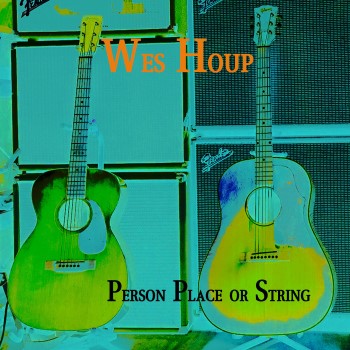
Wes Houp happens to be a MTSU literature professor, but he also stands behind his own recipe of grizzled delta blues. He recorded an album called Person Place or String, which carries a pioneer spirit and plenty of gristle around the edges—an attitude that we are beginning to see less and less of. Wes Houp is one of the artists keeping the unvarnished and organic alive in a world where electronic instrumentation is the common denominator of popular music. Person Place or String shares a blend of styles that fall in the realm of modern Americana music (folk, country, bluegrass, etc.). Nevertheless, Wes Houp keeps his soul at the helm.
Minimalist arrangements are the name of the game, as Wes Houp’s music belongs to a lifestyle long past. It was a time when a guitar was an all-in-one band that took care of the rhythm, melody and chord progression simultaneously. The word “wholesome” comes to mind. The uncut warmth of his acoustic guitar seems to be a lifelong friend of Wes’s rough ’n’ tumble vocal style. Wes has the charming simplicity of Bob Dylan and Randy Newman. Houp even has a small slice of Murfreesboro paired with his music. Think small-town appeal and backyard brews.
Much like the arrangements and his voice, the lyrics are for everybody. There aren’t any cryptic messages or obscure metaphors. Wes tells it like it is, and every now and then a fiddle or electric guitar comes in to help tell the tale. The recordings themselves are nicely done, though the musical profile can sound very “bare” and some of the mixes sound really imbalanced. For example, some songs feature instruments that overshadow the vocals. At the same time, this bare-bones recording quality is enjoyable. Sometimes imperfection can be a good thing.
Wes Houp lets his character shine out in a modest manner. It leads us to believe that he truly enjoys what he’s doing, and he believes the stories he tells through music. This is one of those albums that deserves some much-needed local attention and praise. It’s impressive, to say the least. Houp’s album, a sassy, warm blues/folk record worth every second, is far from perfect, but it might actually be the prime example of everything music should be these days. Take it for what it is, and enjoy it for what it isn’t.













